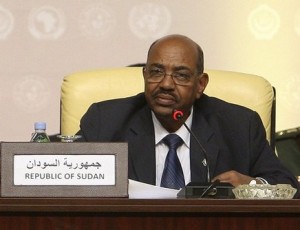Bashir to declare Sudan’s new government lineup in late August
August 16, 2011 (KHARTOUM) – Sudan’s president Omer Al-Bashir will announce a new government makeup that will see the country’s cabinet being halved and security apparatus bifurcated, according to officials from his ruling party.

This will be Sudan’s first government formation since the country split in two last July when South Sudan declared independence in line with the outcome of the region’s referendum vote on independence held at the start of this year.
In an address to the parliament last month, President Al-Bashir outlined the features of his “second republic,” promising a trenchant policy of reforms and balanced development in a bid to remedy the country’s chronic concentration of wealth and power in the center.
Sudan also said it intends to cut government spending and perks as the country sails into economic uncertainties following the loss of 75 percent of the country’s oil production with the south’s secession.
Al-Haj Adam Yousif, the NCP’s political secretary, revealed that the 33 members of the current cabinet would be reduced to 15 ministers and the National Security and Intelligence Services (NISS) would be split to two branches, one for domestic security and one for external security.
Spending on Sudan’s notorious and fairly bloated security watchdog, NISS, costs the country a great chunk of its budget. Sudan’s expenditure on defense is estimated to have risen from US$2.469bn in 2009 by 36.18% in 2010, according to a report produced by Research And Market in 2010.
Yousif said in statements to the independent Arabic daily Al-Ahdath newspaper that his party had formed a committee to craft recommendations for state restructuring and formation of the new government. He further said that the committee had finalised its recommendations and would refer them to Al-Bashir in the upcoming days.
According to Sudan Tribune’s sources, the committee’s report has recommended mergers between some ministries and elimination of others.
Sudan’s current cabinet is composed of 35 portfolios occupied exclusively by NCP members and associates. Opposition parties criticise what they deem as an excessively big government and extravagant expenditure on state officials’ perks.
Furthermore, the NCP’s committee report recommended the creation of three vice-presidents’ positions to be occupied by two individuals from the western region of Darfur and eastern Sudan respectively beside the current vice-president Ali Osman Mohamed Taha.
The NCP official also said that the president was seeking to form a government that enjoys consensus among the people and political forces.
Al-Bashir’s party has been engaged in talks with the mainstream opposition National Umma Party (NUP), led by former prime minister Al-Sadiq Al-Mahdi, and the Democratic Unionist Party (DUP) of Mohamed Osman Al-Mirghani in order to reach a power-sharing deal.
But the talks have so far failed to produce results amid reports of disagreements and refusal by the NCP to offer meaningful concessions.
Other opposition groups, most notably the Popular Congress Party (PCP) of Islamist leader Hassan Al-Turabi, remain publicly committed to regime-changing agendas and voice opposition to dialogue with the NCP which they accuse of a long list of failures, including the country’s breakup and worsening economic conditions.
Yousif said that incorporation of the DUP and NUP into the government was still under discussion. However, he stressed that his party would not forgo its demand for slashing the cabinet and would not allot any portfolios to the two opposition parties in the new government even if they end up participating in the government.
He further admitted the existence of a gap between the stances of his party and those of the opposition but he added that the dialogue was still ongoing.
Meanwhile, an NCP official told the London-based Al-Hayat newspaper said that Al-Bashir does not mind the participation of opposition parties in the cabinet with 30 percent of its seats as well as the establishment of an advisory council that includes representatives of the opposition.
However, the anonymous official said there would be legal difficulties in incorporating opposition parties in the parliament given that the members of the NCP-dominated parliament were elected in the disputed national elections of April 2010.
The NCP official further revealed that his party was facing a great deal of pressure due to the fact that many current ministers would lose their positions in the new cabinet makeup.
There are 77 federal and state ministers in the current government, with a dearth of technocrats and the majority being members of the NCP or parties aligned with the NCP.
(ST)
